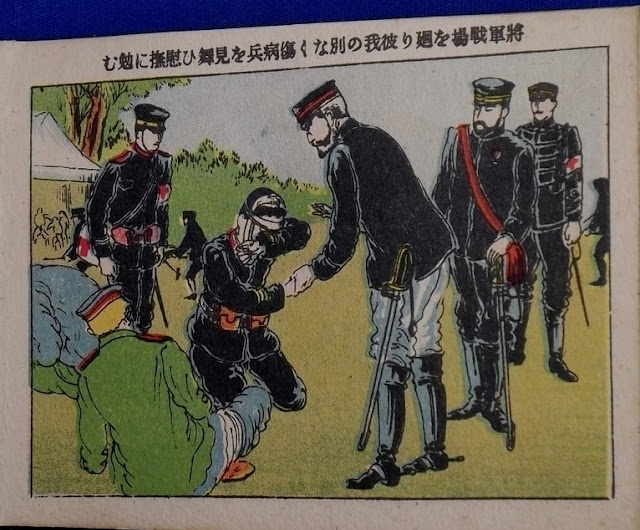Right after the beginning of the Russo Japanese war, the Japanese government gave the public instruction not to have hostility toward ordinary Russians.
From political viewpoint, that might be from their cold calculation in that...
<This War was being watched by the world.>
<Japan needed to show its morality to join the world powers club.>
<It was not wise to let the war defined as the one like "a Christian country VS. a non-Christian">
Apart from politics, "humanism" actually, occasionally, arose in the battlefields.
Japan's red cross medic unit aided the wounded regardless of friend or foe.
One day, during a fierce battle between Japanese infantry & Russian trench,
some Japanese soldier got wounded near the enemy trench.
Everyone saw him still alive but unable to move.
Suddenly , a Russian officer stood up, walked to the Japanese wounded,
lifted & carried him back to the Japanese troops, meanwhile gun fires ceased.
Another day, during the Siege of Port Arthur,
a Russian coin wrapped in paper came down from their position,
which was picked up by a Japanese soldier and sent to the 3rd Army's Headquarters.
The paper said " Asking the Japanese troops. Please send this letter to my mother in Russia to let her know I am fine. Use this coin for the postage"
General Maresuke Nogi, the commander of the 3rd Army, ordered to send the letter,
making up for shortage of postage fee.
This type of humanism was often described in Russo Japanese War artworks.
I feel Russo Japanese war art is more objective conveying the war information as it is than the one afterward, showing dead Japanese soldiers, humanism episodes, and even "saving the enemy".
When it comes to humanism, though it does not contribute to raising fighting spirits or national prestige, it makes sense in order to convey war information as it really is.
Also, It must have been an ideal method to tell importance of morality , as morality in emergency is the genuine one.
In artworks of 2nd Sino Japanese war and Pacific War,
"humanism" or "saving the enemy" description disappeared, otherwise it became propaganda-like.
And Japanese soldiers are hardly killed in it. That makes sense for national prestige.
But I prefer the Russo Japanese wartime.



No comments:
Post a Comment